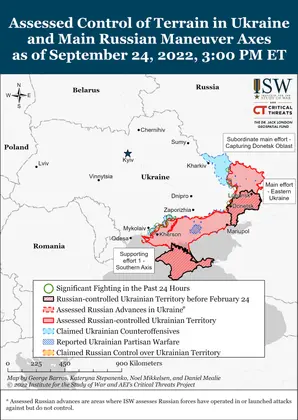Key Takeaways
- Local military commissars are carrying out mobilization orders in a way that suggests a possible disconnect between Russian Defense Minister Sergey Shoigu’s guidelines for partial mobilization and Russian President Vladimir Putin’s demands for haste.
- Russian President Vladimir Putin is likely continuing to address systemic issues in Russian senior command by replacing individual senior subordinates.
- Russia may be preparing to forcibly mobilize Ukrainian prisoners of war in what may constitute a violation of the Geneva Convention on Prisoners of War.
- Ukrainian forces likely continued to make gains along the Kharkiv-Luhansk Oblast border and northwest of Lyman.
- Ukrainian military officials indicated that the continued Ukrainian interdiction campaign in southern Ukraine is degrading Russian combat capabilities.
- Russian sources identified three locations where Ukrainian troops conducted ground operations in Kherson Oblast- northern Kherson Oblast, western Kherson Oblast near the Inhulets River, and northwest of Kherson City near the Mykolaiv-Kherson Oblast border.
- Russian forces conducted ground attacks around Bakhmut, Donetsk City, and in western Donetsk Oblast.
- Russian authorities continue to coerce residents of occupied Ukrainian territory into voting in sham referenda.
Russian Defense Minister Sergei Shoigu’s declarations about which categories of Russian males will be exempted from partial mobilization may not reflect Russian President Vladimir Putin’s intentions or orders. A Russian media insider claimed on September 24 that officials of the Russian Ministry of Defense (MoD) reprimanded military commissars in person for negligence in carrying out mobilization and sending out summonses in “excess,” and contrary to the explicit MoD guidance regarding exemptions for age, disability, or other limiting factors.[1] Another Russian source claimed that certain heads of federal subjects acknowledged that they have mobilized citizens who are technically ineligible.[2]
JOIN US ON TELEGRAM
Follow our coverage of the war on the @Kyivpost_official.
Responsibility for the partial mobilization appears to be divided and complex, possibly contributing to confusion, disorganization, and violations of Shoigu’s commitments regarding exemptions. The mobilization decree specifies that Russian federal subjects are responsible for executing the mobilization while the MoD sets quotas and deadlines for filling them.[3] A Russian milblogger, in fact, criticized the governor of Russia’s Belgorod Oblast for not being an active participant in the mobilization process and noted that the mobilization decree places the onus of carrying out mobilization orders on the heads of federal subjects and not on military commissars.[4] Military commissars likely work for the heads of federal subjects, however, rather than directly for the MoD, making both responsible for mobilization and creating a possible gap between them and the Defense Ministry.

N. Korean Troops Massed in Russia to Enter Ukraine War ’Soon’: Pentagon Chief
The military commissars are generally acting as if they had received orders to prioritize getting bodies to training centers over adhering to Shoigu’s guidelines, and the seemingly confused chains of responsibility for executing the mobilization decree may be responsible for the divergence between Shoigu’s statements and commissars’ actions. Shoigu emphatically reiterated on September 21 that mobilization is partial and will only rely on those already in the reserve and with combat experience and military experience, but military commissars failed to adhere to Shoigu’s guidance, practically from the onset of the mobilization order.[5] Continued reports of military commissars conducting chaotic distribution of mobilization summonses indicate that they feel significant pressure to carry out mobilization as quickly as possible. Ukrainian sources reported that Russian authorities are immediately mobilizing individuals in occupied areas of Ukraine after “rewarding” them with Russian passports for participating in sham referenda rather than waiting until annexation makes the mobilization of eligible males in Russian-occupied areas legal under Russian law. This haste suggests that military commissars feel pressure to expedite mobilization which is not reflected in Shoigu’s statements.[6] The MoD is evidently not in full control of mobilization, raising questions about which Russian males actually will be mobilized and how effective the mobilized force will be.[7]
Positions held by senior Russian military leadership are continuing to change hands, suggesting that Russian President Vladimir Putin is continuing to see systemic problems as the result of the personal failings of senior subordinates. The Russian MoD reported on September 24 that Colonel-General Mikhail Mizintsev has been appointed Deputy Defense Minister and will oversee logistics for the Russian Armed Forces, replacing Army General Dmitry Bulgakov.[8] Mizintsev previously acted as head of the Russian National Defense Control Center and served during Russian operations in Syria, notably commanding troops on the operational-tactical level during the encirclement of Ukrainian forces in Mariupol.[9] The replacement of individual senior leaders is very unlikely to fix fundamental structural problems in the Russian military. It reflects Putin’s personality-driven approach to leadership and relative disdain for system-building—both factors that contributed to the overall failures of the Russian military in this war.
Russian forces may be preparing to forcibly mobilize Ukrainian prisoners of war (POWs) to fight for Russia, which would constitute a violation of the Geneva Convention on Prisoners of War. Russian state media reported on September 24 that Ukrainian POWs detained at the Olenivka prison camp orally “requested” Donetsk People’s Republic (DNR) authorities to allow them to fight in the DNR’s volunteer “Bohdan Khmelnitsky” Cossack Battalion. [10] If Russian or Russian proxy forces coerced Ukrainian POWs into combat, it would be a violation of the Geneva Convention on Prisoners of War, which stipulates that “no prisoner of war may at any time be sent to or detained in areas where he may be exposed to the fire of the combat zone” and shall not “be employed on labour which is of an unhealthy or dangerous nature.”[11]
See the full report here.
You can also highlight the text and press Ctrl + Enter






